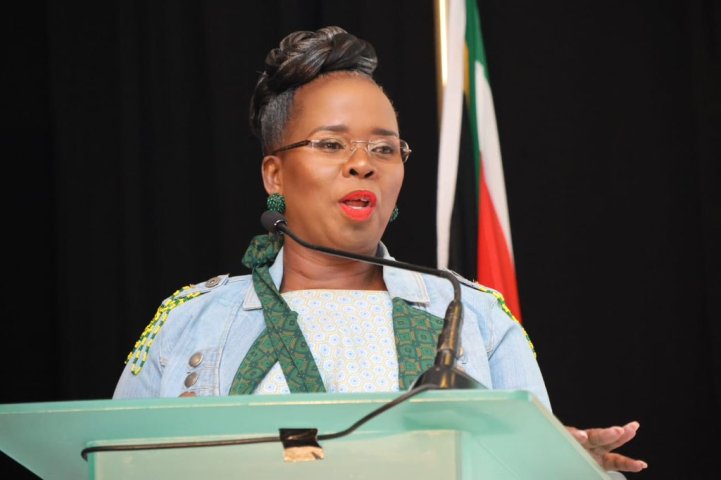Nomakhosazana Meth Urges G20 to Tackle Labour Inequality and Promote Fair Economic Growth
Minister Meth highlighted the serious implications of the increasing erosion of labour’s share of national income, calling it a major threat to broader economic resilience and inclusive growth.

- Country:
- South Africa
South Africa's Minister of Employment and Labour, Nomakhosazana Meth, delivered a powerful address at the second G20 Employment Working Group meeting in Umhlanga, KwaZulu-Natal, on Tuesday, urging G20 member states to urgently address the growing inequality and the erosion of labour's share of national income. Meth warned that these trends, if left unaddressed, threaten not only global economic stability but also social cohesion and sustainable development worldwide.
Erosion of Labour’s Income Share Threatens Economic Stability
Minister Meth highlighted the serious implications of the increasing erosion of labour’s share of national income, calling it a major threat to broader economic resilience and inclusive growth. “The growing erosion of labour's share of national income poses a significant threat to broader economic resilience and inclusivity goals by widening wealth disparities, weakening the social fabric, and limiting upward mobility,” she said. This disparity, according to the Minister, is undermining the very foundations of fair and inclusive societies.
The minister stressed the urgent need for global leaders to focus not just on GDP or trade metrics when assessing economic progress, but on the ability of economies to provide decent work, fair wages, and inclusive opportunities for their populations. "Economic progress cannot be measured solely by GDP or trade metrics. It must also be measured by the ability to uplift vulnerable communities through fair and dignified work," Meth said. She argued that the path to economic stability should be rooted in the upliftment of the most marginalized, rather than solely relying on figures such as GDP and trade balances, which do not reflect the lived realities of working people.
Gender Equality and Youth Employment as Key Priorities
A significant part of Meth's speech focused on gender equality in the workplace and youth employment. She emphasized that closing gender gaps in employment and pay was both a moral imperative and a catalyst for innovation and prosperity. "Gender equality is not just a right—it is a driver of economic growth. Closing the gender gaps in pay and employment is essential for sustainable prosperity," she stated. The Minister also highlighted the importance of reducing youth unemployment, noting the critical role young people play in the future of global economies.
The Employment Working Group, under the leadership of South Africa, has set ambitious goals for youth employment, including the "Nelson Mandela Bay Goal," which aims to reduce global youth unemployment by 5% by 2030. Meth made it clear that this was not just an employment target but an investment in the future of societies worldwide. She urged G20 nations to create quality jobs, focus on skills development, and support youth-led innovation to ensure young people are integrated into the evolving labour market.
Moreover, Minister Meth reiterated the importance of advancing policies to close gender gaps in labour force participation, pointing to the renewed commitment to the Brisbane-eThekwini Target. This global target aims to boost female participation in the workforce, which is essential not only for gender equality but also for the long-term sustainability of economies.
Combatting Global Trade Disruptions with Resilient Labour Policies
Another significant concern raised by Meth was the disruptive impact of global trade shifts. These changes, particularly those affecting developing nations, could lead to widespread economic stagnation and job losses. Meth urged G20 countries to adopt resilient labour market policies that will safeguard jobs, protect workers, and ensure that economies remain stable in the face of these global disruptions.
"South Africa stands firm in advocating for fairness, inclusion, and social justice in every global policy. We will continue to champion decent work, robust labour protections, and equitable economic opportunities for all," Meth declared. She also made it clear that South Africa would resist any efforts—domestic or international—that could undermine its sovereignty, the dignity of its people, or the fundamental rights of workers.
Labour Market Reforms for Long-Term Global Stability
Minister Meth concluded her address by underscoring that the future of work should not merely be shaped by abstract policy frameworks but by tangible, measurable improvements in people's lives. “The decisions we make today will have real-world implications on the lives of millions of workers. We must ensure that our discussions translate into meaningful action,” she said.
Meth called for a global focus on ensuring that economic growth leads to substantive social justice, quality jobs, and decent pay. She warned that without systemic reforms to ensure fair distribution of economic gains, wealth disparities will continue to widen, causing severe social and economic destabilization.
In reiterating South Africa’s commitment as the G20 President to solidarity, equality, and sustainability, Meth urged all G20 nations to adopt inclusive, people-first policies that will contribute to global economic stability, uplift vulnerable communities, and promote the dignity of all workers.
The Minister's address serves as a timely reminder that the future of work, and by extension, the future of global economies, rests on the principles of fairness, inclusion, and respect for workers’ rights.
- READ MORE ON:
- Nomakhosazana Meth
- G20 Employment Working Group
- G20










